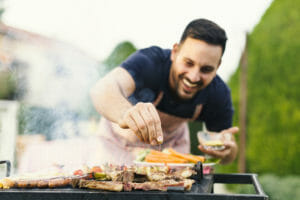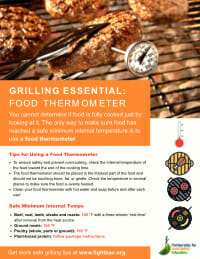 A true “Grill Master” always knows to clean, separate, cook and chill to ensure a pleasant cookout for all.
A true “Grill Master” always knows to clean, separate, cook and chill to ensure a pleasant cookout for all.
- Wash your hands with warm water and soap for at least 20 seconds before and after handling food.
- Always marinate foods in the refrigerator, not on the counter or outdoors. Don’t use sauce that was used to marinate raw meat or poultry on cooked food. Boil used marinade before applying to cooked food or reserve a portion of the unused marinade to use as a sauce.
- When grilling foods, preheat the coals on your grill for 20 or 30 minutes, or until the coals are lightly coated with ash.
- If you partially cook food in the microwave, oven or stove to reduce grilling time, do so immediately before the food goes on the hot grill.
- When it’s time to grill the food, cook it to a safe internal temperature. Use a food thermometer to be sure. The food thermometer should be placed in the thickest part of the meat and should not be touching bone, fat, or gristle. Check the temperature in several places to make sure the food is evenly heated.
- Beef, veal and lamb steaks and roasts: 145 °F for medium rare and 160 °F for medium.
- Ground pork and ground beef: 160 °F.
- Poultry: to at least 165 °F.
- Fin fish: 145 °F or until the flesh is opaque and separates easily with a fork.
- Shrimp, lobster and crabs: The meat should be pearly and opaque.
- Clams, oysters and mussels: Until the shells are open.
- Never place cooked food on a plate that previously held raw meat, poultry, seafood or eggs. Be sure to have plenty of clean utensils and platters on hand.
- Grilled food can be kept hot until serving by moving it to the side of the grill rack, just away from the coals to avoid overcooking.
- Never let raw meat, poultry, eggs, cooked food or cut fresh fruits or vegetables sit at room temperature for more than two hours before putting them in the refrigerator or freezer (one hour when the temperature is above 90 °F).
Resources
If you have more questions or concerns about food safety, visit these websites:

